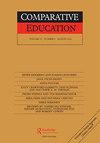Comparative education or epistemological power games for world domination
IF 3.7
1区 教育学
Q1 EDUCATION & EDUCATIONAL RESEARCH
引用次数: 6
Abstract
ABSTRACT This article argues that the worlds which comparative education has explored and is exploring are characterised by three main political patterns. The first and oldest is the competitive nation-state as the starting point of the comparison, an educationalised nation-state, one whose relative global strength in economy and military prowess is attributed to the education system. The second pattern, easily visible in the Cold War, is the idea of an almost standardised progression, linked to economic, military and thus geopolitical power. And the contemporary pattern is that this nexus of global potency and education can be broken down into comparative school performance tests (for example in PISA currently) through which reform needs (almost automatically) are formulated at home, and elsewhere. If this analysis and its history – which is illustrated in the following – is even approximately accurate, ‘comparative education’ may need to re-think some of its basic assumptions about itself.为统治世界而进行的比较教育或认识论权力游戏
本文认为,比较教育已经探索和正在探索的世界具有三种主要的政治模式。第一个也是最古老的是作为比较起点的竞争性民族国家,一个受过教育的民族国家,其经济和军事实力的相对全球实力归因于教育体系。第二种模式很容易在冷战中看到,它是一种几乎标准化的发展模式,与经济、军事以及地缘政治力量联系在一起。当代的模式是,这种全球潜能和教育的联系可以分解为比较学校的表现测试(例如目前的PISA),通过这些测试,国内和其他地方的改革需求(几乎是自动的)得以制定。如果这种分析及其历史——如下所示——是大致准确的,那么“比较教育”可能需要重新思考它对自身的一些基本假设。
本文章由计算机程序翻译,如有差异,请以英文原文为准。
求助全文
约1分钟内获得全文
求助全文
来源期刊

Comparative Education
EDUCATION & EDUCATIONAL RESEARCH-
CiteScore
7.40
自引率
21.20%
发文量
35
期刊介绍:
This international journal of educational studies presents up-to-date information with analyses of significant problems and trends throughout the world. Comparative Education engages with challenging theoretical and methodological issues - and also considers the implications of comparative studies for the formation and implementation of policies - not only in education but in social, national and international development. Thus it welcomes contributions from associated disciplines in the fields of government, management, sociology - and indeed technology and communications - as these affect educational research and policy decisions.
 求助内容:
求助内容: 应助结果提醒方式:
应助结果提醒方式:


